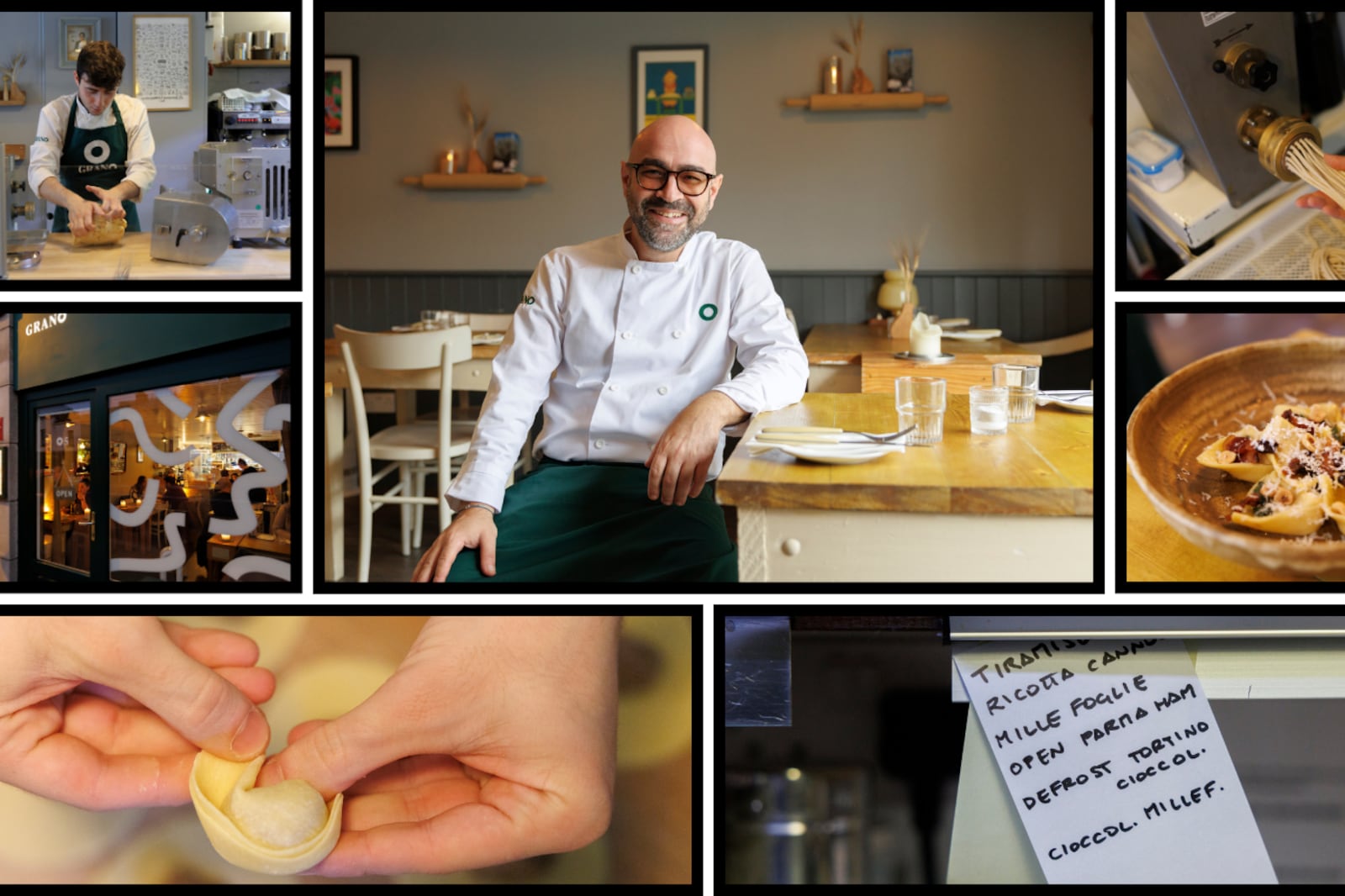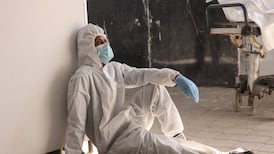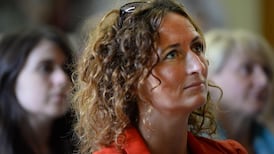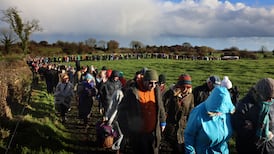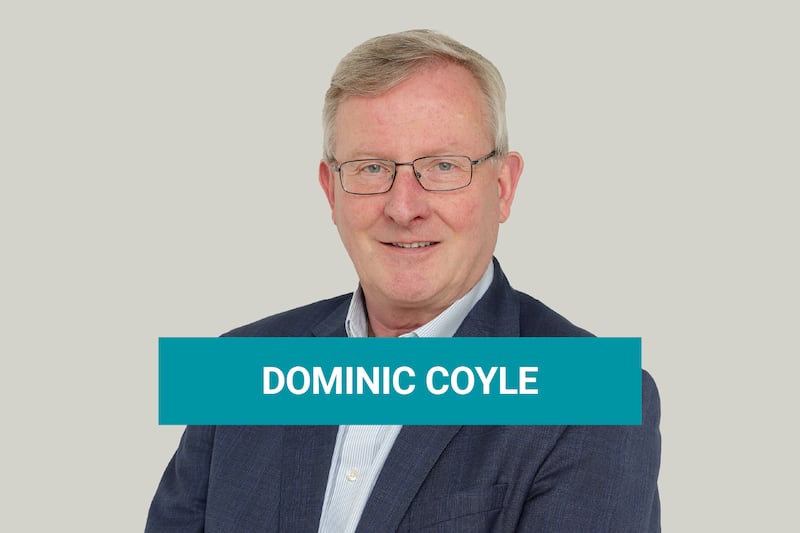A loud noise from a speaker caused the congregation to visibly jump. It made sense that they would be frightened: this Greek Orthodox Christian church, in the Syrian capital Damascus, was the target of a suicide bombing just months before. Yet on a recent Sunday, hundreds still turned out for the Divine Liturgy.
The service took place in the basement: the main section of the Mar Elias church was being renovated after becoming the site of mass killing. In the ceiling above, damage was still visible. Builders could be seen through high windows.
The gun attack and subsequent bombing took place on June 22nd, killing 22 people, according to Mar Elias priests, though other sources put the figure at 25. A little-known group called Saraya Ansar al-Sunna claimed responsibility, saying the attack was a response to “provocation”, seemingly related to efforts to prevent Islamic proselytisation in the neighbourhood. Syria’s government said the attack was linked to the so-called Islamic State, which did not claim responsibility.
“What do you think about Christians in this country? I think all the Christians, maybe they will die, it’s not safe,” said Samir Mansour (62), standing near the back of the church as the Sunday service continued. “All the people here, they want to leave this country,” he said. “Can you tell your government ... if they can give a visa, these people will go?”
READ MORE
Mansour’s son was injured in the bombing and underwent months of physical therapy. Mansour came to church that day because it was the first anniversary of his brother’s death: his name would be read and he would be remembered. He said he usually only attends church at Christmas, Easter and for marriages.

His anxieties are echoed by many Christians living in Syria nearly one year after the fall of Bashar al-Assad’s regime.
President Ahmed al-Sharaa came to power last December when a coalition of rebels, headed by his Islamist militant group Hayat Tahrir al-Sham (HTS), took over the country in a shock offensive.
Assad long portrayed his dictatorship as a protector of religious minorities, while painting all armed opposition as extremist “terrorists”. This was despite his regime being responsible for the vast majority of civilian deaths over nearly 14 years of war. Before the 2011 revolution, Christians made up about 10 per cent of the country’s population of 22 million, though that number has significantly dwindled, with many emigrating.
Analysts say the Assad regime played different communities off against each other as a method to exert control, particularly over the Sunni Muslim majority. Many Syrians accuse the regime of imbuing hatred and distrust between different groups, causing the country’s citizens to become more sectarian.
An EU statement in about the attack on the church said “heinous and cowardly violence against Christians is an attack against all Syrians. It is a grave reminder of the need to intensify efforts against the terrorist threat and to ensure the enduring defeat of Daesh [Islamic State] and other terrorist organisations. At this critical juncture for the country, the EU stands in solidarity with the Syrian people and supports all efforts by the transitional authorities aimed at ensuring the security of all Syrians with no discrimination of the basis of ethnic and religious background.”

Some concerns related to religious freedom raised by Christians in the early months of the new government have not come to pass. Alcohol is still freely available in Christian areas of Damascus such as Bab Touma, for example. There is no mandatory headscarf.
But this year, there have been spates of sectarian killings in the coastal regions, mostly targeting Alawites, and in the Druze city of Sweida, raising concerns about the level of control Syria’s government has over forces aligned with it and the fragile nature of a post-dictatorship society.
Syria’s government says it is working to instil order but it will take time. Syria’s foreign ministry called the Mar Elias bombing “a desperate attempt to undermine national coexistence and to destabilise the country”, while president Sharaa promised to “work day and night ... to capture all those who participated in and planned this heinous crime.”
Syria’s interior ministry said its security forces later raided hideouts, arresting six people and killing two, one of whom it said had facilitated the attack.
In the aftermath of the Mar Elias attack, hundreds of Christians marched in Damascus calling for foreign fighters to leave Syria. Thousands of foreign fighters – many with extremist views – supported the rebel coalition that ousted the Assad regime.

Sitting in his office on his church’s grounds, Fr Youhanna Shahade emphasised that the murdered Christians should be called “martyrs”, as they were killed while praying.
The 40-year-old said Mar Elias serves 5,000 families, running services three days a week, but also funding medical care and education, and helping parishioners connect with Christian institutions for further assistance. A woman entered to ask if the church could pay to fill her prescription: Fr Shahade agreed to help. Individuals donate to help others, he explained.
Need is increasing, he said. “Every day we get knocks on our door from Christians and non-Christians saying please give us bread ... We’re doing our best but it’s not enough.” Poverty is widespread across Syria, among all communities, with the UN saying in 2023 that 90 per cent were living below the poverty line.
While many members of minorities say they suffered badly under the regime, including through surveillance and the ongoing risk of imprisonment and torture, there is a widely-held belief that others were privileged and given increased opportunities. Fr Shahade said many of his church’s attendees lost their jobs after the regime fell: another blow in a country where the economy has been decimated by war and isolating sanctions.
After the June attack, Fr Shahade – who was present when the bombing happened, along with about 249 others – said they spent the night cleaning so they could hold another service the next day. “We refused to stop praying,” he said.

In September, they baptised 22 children in memory of the 22 lives lost. “We searched and found who are the most needy from the area and tried to reverse the sadness with a lot of joy. It was a huge ceremony and we invited everyone.”
While some people who used to come to church stay away now, most “have a strong faith”. Fr Shahade said the priests provide “psychological help” to make people feel better about attending.
They have appointed young Christian men to stay at the church’s entrances and watch out for attackers: he said they are unarmed. When asked what they would do if another attack happened, Shahade responded, “we will pray.”
A spokesperson for Syria’s general security did not respond to a request for comment on what protections are being provided for Christians in the wake of the bombing.
Speaking in New York in September, president Sharaa said that “Syria inherited a lot of conflict and problems and there are parties” who benefited under the former regime “who try to raise sectarian divides and violence”.
“We are not going to judge people based on their religions ... everybody has the right to live in Syria and the rule of law is going to be upheld,” he said, adding that any violations would be prosecuted.

The president also emphasised that this is a transitional period and it will take time to reach stability and safety. He said elections in the future will enable different groups to be properly represented.
Fr Shahade said they don’t know whether to be frightened of the new government because they do not see adequate communication from it. “Every single decision, we don’t read it from official TV or newspapers, it’s rumours on Facebook.”
He said he recently saw a video of someone threatening Alawites and Christians on social media, but he did not know if this was endorsed by authorities.
“It’s so foggy, everything is new. We don’t really know if it’s going to end with good or bad results.” He said “no one knows” if danger persists and what new form it could take, but it was clear that Christians “are afraid for their future, they don’t know what’s going to happen next”.
[ Putin welcomes new Syrian leader while still harbouring the old oneOpens in new window ]



